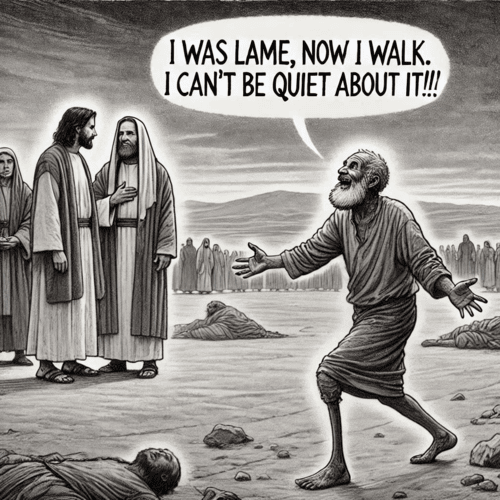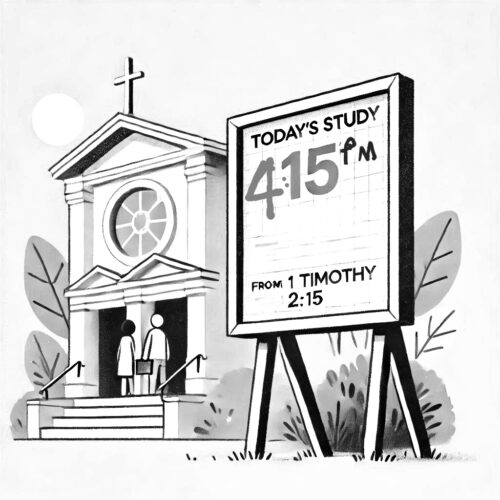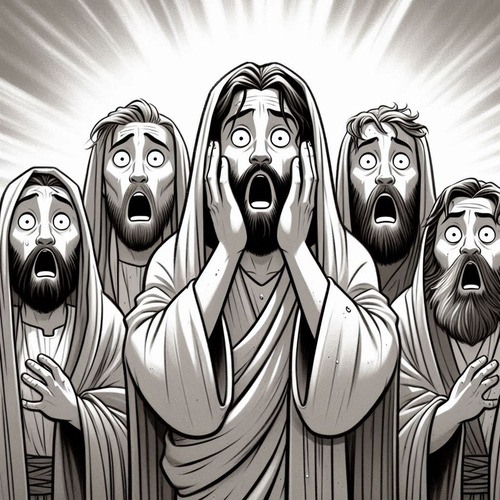The Messianic Secret: Why Did Jesus Command Silence About His Identity?
Throughout the Gospels, particularly in Mark’s narrative, we encounter a striking phenomenon: Jesus repeatedly commands both demons and human witnesses to maintain silence about His identity and works (Mark 1:34, Mark 3:12, Mark 8:30). This pattern, termed the “Messianic Secret” by some, reveals profound theological truths about God’s sovereign plan and Christ’s intentional method of self-revelation.
Introduction
“And he strictly ordered them not to make him known” (Mark 3:12). This recurring command from Jesus presents what Herman Bavinck calls “one of the most remarkable features of Christ’s self-revelation.” In his Reformed Dogmatics, Bavinck observes the pattern “demonstrates not hesitation about His identity but rather sovereign control over its disclosure.”
John Calvin notes in his Commentary on Mark, “Christ had a reason for not wishing to be proclaimed openly… until the completion of His ministry would make the timing perfect.”
Biblical Foundation
The Messianic Secret manifests in three distinct categories of silence commands:
- To Demons (Mark 1:34; Luke 4:41)
- To Healed Individuals (Mark 1:44; Matthew 9:30)
- To Disciples (Matthew 16:20; Mark 9:9)
Geerhardus Vos, in The Self-Disclosure of Jesus, argues these categories demonstrate “a carefully structured revelation that aligns with redemptive-historical necessity.” He writes, “The timing of Christ’s full disclosure was intimately connected with the progress of His redemptive work.”
Historical Context
To understand the Messianic Secret, we must first grasp the charged atmosphere of first-century Palestine. Jewish expectations of the Messiah were predominantly political—many awaited a military leader who would overthrow Roman rule and restore Israel’s kingdom.
These expectations were rooted in several Old Testament prophecies:
- The royal Messiah of Psalm 2
- The Son of Man in Daniel 7:13-14
These expectations created a volatile environment where premature revelation of Jesus’ messianic identity could have derailed His divine mission.
Under Roman occupation, any claim to kingship or messianic status could trigger immediate political repercussions. The Jewish people’s eagerness for political liberation meant they might attempt to force Jesus into a role that didn’t align with His true mission as the suffering servant-king.
Theological Purpose
The Messianic Secret serves multiple theological purposes within God’s sovereign plan for redemption. First, it demonstrates Jesus’ conscious control over the timing and nature of His self-revelation. His frequent reference to “My hour has not yet come” (John 2:4) reveals His submission to the Father’s perfect timing.
This progressive revelation of His identity also served to redefine messianic expectations. Rather than conforming to popular demands for a political liberator, Jesus gradually unveiled His true mission as the suffering servant prophesied in Isaiah 53. His pattern of commanding silence, particularly after miracles, helped prevent His ministry from being reduced to mere wonder-working. It also served to emphasise His deeper mission—the redemption of humankind.
Perspectives From Reformed Theology
From a Reformed perspective, the Messianic Secret demonstrates God’s sovereignty in revelation. Just as God sovereignly determines who receives the effectual call to salvation, Christ sovereignly controlled the revelation of His identity according to the Father’s perfect plan.
This pattern also reflects the Reformed understanding of Christ’s conscious and perfect execution of His mediatorial office. Far from being uncertain about His identity or mission, Jesus demonstrated complete control over how and when His true nature was revealed.
The Messianic Secret particularly aligns with Reformed emphasis on God’s sovereign timing in revelation and salvation. Just as God’s effectual calling comes at His appointed time, Christ’s self-revelation followed the Father’s perfect schedule.
Pastoral and Practical Applications
The Messianic Secret offers several crucial lessons for Christian life and ministry today. First, it reminds us God’s timing in revelation is perfect. Just as Jesus unveiled His identity according to the Father’s schedule, we must trust God’s timing in our spiritual growth and ministry.
This pattern also provides wisdom for discipleship and evangelism. Spiritual truth is often revealed progressively, requiring patience and wisdom in how we present Christ to others. True discipleship involves more than just knowing facts about Jesus—it requires a deepening understanding of His person and work.
Conclusion
The Messianic Secret is a testament to God’s wisdom in redemptive history. Rather than a strategy of confusion, it represents God’s wisdom in accomplishing redemption according to His perfect timeline. The pattern challenges us to trust God’s timing and methods, recognising that He reveals truth according to His perfect wisdom.
Understanding the Messianic Secret helps us appreciate the complexity of Christ’s earthly ministry and the perfection of God’s redemptive plan. It reminds us God’s ways are higher than our ways, and His timing is always perfect in accomplishing His purposes for His glory and our good.
The Messianic Secret—Related FAQs
Who coined the term “Messianic Secret”? The term “Messianic Secret” was coined by German theologian William Wrede in his 1901 book “The Messianic Secret in the Gospels.” While Wrede’s conclusions aren’t accepted by Reformed theologians, his term has become useful for discussing the pattern in Jesus’ ministry. Wrede actually used the term to argue Jesus never claimed to be the Messiah and that Mark invented the theme to explain why Jesus wasn’t recognised as Messiah during His lifetime. Reformed scholars firmly reject the view since it undermines the historical reliability of the Gospels.
- Did Jesus’ command for silence ever actually work, or did people spread the news anyway? The Bible shows us some people did ignore Jesus’ commands to keep quiet. They went on to tell others about their healings anyway. Interestingly, even such disobedience actually helped prove how amazing Jesus’ works were—people simply couldn’t help talking about them! However, even when people didn’t follow God’s direct commands, He could still use their actions to accomplish His purposes. Even their disobedience ended up serving God’s plan to gradually reveal who Jesus was.
- Why did Jesus allow some people (the Gadarene demoniac, for instance) to proclaim His identity while commanding others to be silent? Jesus in His incredible wisdom knew exactly when public testimony would help His mission and when it would hinder it. In places where He wouldn’t be staying long (such as the Decapolis where the Gadarene demoniac lived), having someone share their story could prepare people for future ministry. Jesus knew the right approach for each specific situation and location. He wasn’t being inconsistent—He was being strategic about how His identity was revealed in different places.
- How does the Messianic Secret relate to Jesus’ teaching in parables? Both Jesus’ use of parables and His commands for silence served a similar purpose—they revealed truth to some while hiding it from others. When Jesus taught in parables, He explained their meaning to His disciples but left others to puzzle over them. This wasn’t about being unfair—it was about God’s timing in revealing spiritual truth. Some people were ready to understand while others weren’t yet prepared to receive the full truth about who Jesus was.
Was the Messianic Secret a literary device invented by Mark, or a historical reality? Some suggest Mark invented the Messianic Secret, but the evidence strongly suggests it really happened. We see this pattern of Jesus commanding silence in all four Gospels, not just in Mark. It fits perfectly with what we know about the political and religious situation of Jesus’ time. The fact that these commands sometimes seem inconsistent actually suggests they’re historical—if someone were making it up, they probably would have made it neater and more systematic.
The Messianic Secret—Our Related Posts
Editor’s Pick

The Empty Tomb: Did the Disciples Steal Jesus’ Body?
*Editor’s Note: This post is part of our series, Satan’s Lies: Common Deceptions in the Church Today’… DID THE DISCIPLES [...]
‘Saved Through Childbearing’: What Does 1 Timothy 2:15 Mean?
Ancient Ephesus, with its temple to Artemis and its deeply entrenched pagan beliefs about childbearing and feminine power, provides the [...]
Why Can’t There Be Forgiveness Without the “Shedding of Blood”?
Hebrews 9:22 Explained The question haunts the modern mind: why would a loving God require blood for forgiveness? In ancient [...]
Praying in the Spirit: How the Holy Ghost Empowers Our Prayer Life
Ever sat down to pray and felt like you're just talking to the ceiling? If you're not a believer in [...]

Which Saves the Believer: Christ’s Life, Death, or Both?
Which Saves: Christ’s Life, Death or Both? Throughout church history, Christians have pondered the relationship between Christ's perfect life and [...]
Is Faith a Gift or a Response? Biblical Answers to Faith’s Origin
Is Faith a Gift or a Response? Why do some people believe in God while others don't? Why does the [...]
Near Yet Far: How Can God Be Both Transcendent and Immanent?
God Is Both Transcendent and Immanent: The burning bush encounter in Exodus 3 provides a striking picture of God's dual [...]
Living Waters and Jesus: What’s The Connection?
The theme of living waters threads through Scripture like a life-giving stream, carrying profound spiritual significance that speaks to the [...]
What Does It Mean to Quench the Spirit? What the Bible Teaches
"Do not quench the Spirit" (1 Thessalonians 5:19). This brief yet profound command from Scripture carries deep implications for every [...]
The Gospel of Self-Improvement: Is It Just a Pack of Lies?
In a world obsessed with self-optimisation, “you can do it” mantras echo from every corner. From bestselling books promising to [...]












